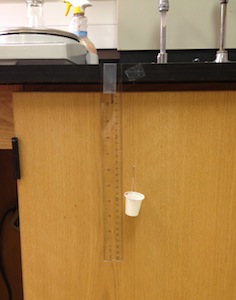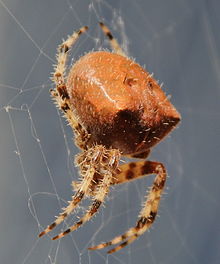Victorias Web
Pepperdine Magazine is the feature magazine for Pepperdine University and its growing community of alumni, students, faculty, staff, and friends.
Victoria Lekson, a Seaver College music performance (harp) and biology double major was awarded a Keck Scholarship from the W. M. Keck Foundation to fund her research into the effects of temperature on the web strength of native Malibu spider, Araneus gemmoides.
 Working with co-mentors Stephen Davis (see main article) and Laurieanne Dent, visiting
professor of biology, Lekson collected spiders from Tapia Park in Malibu Creek State
Park in order to test the tensile strength of the spider’s web at various temperatures—tensile
strength meaning how much weight can be applied to the web silk before it will break.
Working with co-mentors Stephen Davis (see main article) and Laurieanne Dent, visiting
professor of biology, Lekson collected spiders from Tapia Park in Malibu Creek State
Park in order to test the tensile strength of the spider’s web at various temperatures—tensile
strength meaning how much weight can be applied to the web silk before it will break.
“I had hypothesized that their webs would be strongest at the average temperature
of Malibu, since that is what they’re acclimatized to, but it turns out it’s not to
be the case,” says Lekson.
“Spiders are exothermic, meaning they rely on the temperature of the environment to
control how they function, and so temperature affects how fast they can produce silk,”
she explains. “What surprised me is that even though they produce more silk when it’s
hot, it’s not as strong. In the winter, they slow down a lot and make thick silk.” The money awarded to Lekson from the W. M. Keck Foundation has gone towards buying
an adaptor for an Instron machine that Pepperdine owns—a device that measures tensile
strength but is not sensitive or gentle enough to test spider silk. Before receiving
the adaptor, she set up preliminary tests the old-fashioned way: by slowly adding
water to a small cup, hanging by the strength of the spider silk, and seeing how far
it would stretch before breaking.
The money awarded to Lekson from the W. M. Keck Foundation has gone towards buying
an adaptor for an Instron machine that Pepperdine owns—a device that measures tensile
strength but is not sensitive or gentle enough to test spider silk. Before receiving
the adaptor, she set up preliminary tests the old-fashioned way: by slowly adding
water to a small cup, hanging by the strength of the spider silk, and seeing how far
it would stretch before breaking.
“Eventually I want to use the data to see how protein composition in the silk changes
at different temperatures,” Lekson says. “Spider silk is a great biological material—it’s
really strong and conductive. The more data we have, the closer we get to synthesizing
the silk in labs without spiders.”
Synthesizing spider silk could be beneficial in a number of ways, one of which includes
the design and production of harp strings. Lekson, who has been playing the harp for
years and co-majors in harp performance at Pepperdine, notes that scientists have
already made violin strings from spider silk. She remembers, prior to deciding to pursue this research project, collecting insects
as part of a class with Davis last fall, and finding a number of Araneus gemmoides spiders. “I said at the time that it would be cool if I could make harp strings out
of spider silk. It's such a super versatile material."
She remembers, prior to deciding to pursue this research project, collecting insects
as part of a class with Davis last fall, and finding a number of Araneus gemmoides spiders. “I said at the time that it would be cool if I could make harp strings out
of spider silk. It's such a super versatile material."
